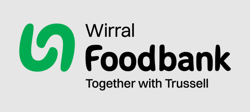Stories of Hope and Hardship from People Using Wirral Foodbank

A collection of stories and statements given by people using Wirral Foodbank across various locations. The insights include people's reasons for using the foodbank and their thoughts on what needs to be changed to end the need for foodbanks.
Insights gathered: July 2024 - July 2025
Insights gathered by
Beth Saunders, Community Organiser and Campaign Manager, Wirral Foodbank
Aim
To find out more information about what is bringing people to the foodbank and what needs to change to end the need for foodbanks from the perspective of people using the foodbank on the day. Our aim was to use this information to form a local campaign and to support our campaigning efforts in general.
People engaged with
We spoke to a wide range of people from almost all demographics who were at the foodbank to collect an emergency food parcel. We spoke to around 150 people across various locations. We spoke to a random sample of people.
Methods
We gathered these insights across 11 Wirral Foodbank locations during foodbank sessions where people come to collect emergency food parcels. We conducted this research through a tablecloth activity.
After collecting their parcel, we invited people over to write their stories of hardship and hope onto a tablecloth alongside other anonymous statements. Most of the time the tablecloth was set up slightly away from the main foodbank session activities.
We used a mix of semi-structured conversations and casual conversations, speaking to people from 1 to 10 minutes. If someone gave a generic answer, we tried to discuss this a bit further to reach an underlying issue. Sometimes we would ask "if you could ask the government to change something, what would it be?" or "what do you think could have prevented you from coming to the foodbank today?". People could read other quotes for inspiration. Stories were often summarised into shorter statements.
Key insights
We found that there was a mixture of 50 different issues that came up, including reasons for coming to the foodbank and ideas for change to prevent more people needing to use the foodbank. These issues spanned themes across housing, the benefits system, food, health, families, employment, advice and information, community shops etc.
The most common issues were as follows (in order of most common):
- Financial support not covering essentials (16)
- Lack of compassion/ improved culture (DWP, UC helplines, Council) (12)
- Cost of Living (8)
- Sanctions/deductions (7)
- Confusing Universal Credit system (6)
- Asylum support (6)
- Digital exclusion (5)
- More streamlined support (5)
- More face-to-face advice and support (5)
- Errors within Universal Credit (5)
- High rents (5)
- Community shops (5)
- Unexpected costs (5)
Themes:
Housing: High rents, suitable accommodation, rough sleeping, eviction, lack of basic amenities and bedroom tax.
Social security: Health benefits, five week wait for Universal Credit to start, improved safety net, lack of accessibility.
Food: Regulate food prices, more access to free local food, better qualities and quantities of food, access to fresh fruit and veg, improve cooking skills, community shops and community meals.
Employment: More help for unemployed people, insecure employment, Universal Credit system not encouraging further work, unfair wages.
Families: Parents trying to work and find childcare and maternity pay.
Health: Mental health and sick pay.
Migrants: Asylum support and lack of rights.
Other issues:
- Transport Costs
- Domestic abuse – financial abuse
- Boredom/lack of inspiration
- Billing errors from energy companies
- Better help for young people
- Cost-of-Living
- Drug and alcohol addictions
- Rights and freedoms
- Increase access to advice and information
Overall, we found that there are a variety of reasons that bring people into Wirral Foodbank and numerous issues that need to change. The insights show us that there is a mixture of national and local issues that need to be addressed to lift people out of poverty. There is a clear correlation between people claiming social security payments and those on asylum support not having enough income to cover essential costs, which is supported by the consistent figure of 80-87% of people using Wirral Foodbank having social security as their source of income. However, the fact that people have told us such a variety of different issues, we are reminded again that there is no one single change that can stop the mass dependence on emergency foodbanks.
Quotes
“We are 5 in a hotel. We are waiting for a house. We don’t have enough money to wash out clothes, to pay for the internet or to buy enough food. I wish they put in a washing machine. We need more asylum support money.”
“I am on low benefits. Had a disaster and my fridge broke down and my food for the week went off”
How have the insights been used/shared?
These insights have helped form our local campaign for ‘More face-to-face advice and support on money matters’ where we have improved communications about advice services and set up a community advice hub. We also use the tabletop quotes to support the national Universal Credit Essentials Guarantee campaign and our local food poverty alliance work.
Messages that have come directly from people using the foodbank are so powerful. We use them to influence and campaign for change with local MPs, for our social media and our campaigning events. This information gives us as foodbank a much better understanding of the issues our clients are facing. We will look at the insights again to help us decide our next local campaign.
Online links
https://wirral.foodbank.org.uk/about/campaigning/
Contact
communityorganiser@wirralfoodbank.org.uk
